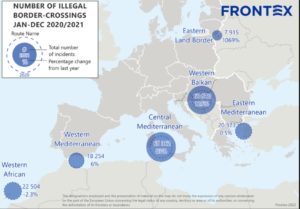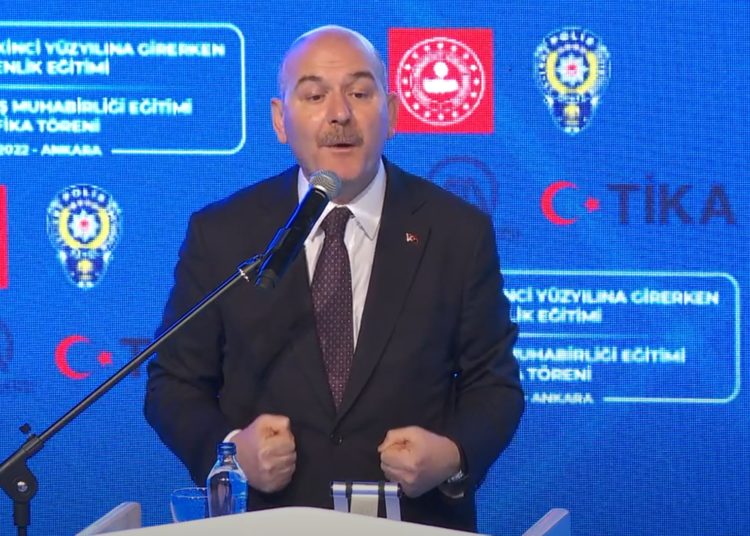Abdullah Bozkurt/Stockholm
Turkey’s domestic security czar has described European Union border agency Frontex as a terrorist organization, accusing it of trying to contain migration at the Turkish-Greek border.
Speaking at an event in Ankara on April 1, 2022, Interior Minister Süleyman Soylu said the European Union established an agency that operates exactly like a terrorist organization, claiming that its mandate is to cover up problems in connection with migration to Europe.
“We all saw what happened in Greece. It’s just part of the picture. [They say] don’t let them come. Let them die wherever,” Soylu said, adding that “[the West] keeps silent if [migrants] freeze to death after pushbacks. Let Frontex, an organization it established that exactly resembles a terrorist organization, cover that up. They have no mercy. Don’t ever think they have compassion or even a shred of humanity in them.”
He claimed the West is trying to contain the migrant crisis to the Turkish-Greek border area, describing what is taking place in Greece as only part of the picture while the world is doing nothing to support migrants.
He then turned his criticism to the US, recalling how Afghans tried to get into US military planes to get out of the country and describing it as the most memorable scene in the demise of the US.
“Don’t forget this. The photo in which the bankruptcy of the US and [NATO] were declared is the photo of the [American] plane that took off from Afghanistan. It is a photograph of an escape, a bankruptcy, a destruction of the US,” he said.
Soylu, a far-right politician in the government of President Recep Tayyip Erdoğan, went on to say that the US “not only invaded Afghanistan and caused children, women, old people and others to perish there, it also turned the entire world upside down. They introduced the world to drugs.”

This is not the first time the Turkish interior minister has bashed Frontex or the US, for that matter, as he has uttered vitriolic comments about both in the past, trying to score political points and shift the blame for his government’s shortcomings on a number of issues.
But calling Frontex a terrorist organization is something he hadn’t done before. The main reason Soylu and other Turkish officials target the European border agency is Frontex’s efforts to thwart Turkey’s efforts to use migrants as a trump card against the European Union and extract concessions from Brussels.
In February 2020 Turkish President Erdoğan announced that Turkey had opened its border with Greece to migrants and refugees, after which Greece saw a large number of migrants at its border with Turkey trying to enter EU territory. .
Soylu was the point man in coordinating the transportation of refugees to the Turkish-Greek border area with a view to enticing them to attempt to cross into Greece. The Directorate General of Migration Management (Göç İdaresi Başkanlığı), a government agency that deals with migration issues, is part of Soylu’s portfolio.
At the time the minister said refugees who cross into Europe would soon top a million and that European governments would fall due to the resulting economic destabilization, adding that Turkey would let all non-Syrian refugees including those from Iran, Pakistan, Afghanistan, Bangladesh, Algeria, Morocco and Africa go to Europe as well.
TV footage from Interior Minister Süleyman Soylu’s speech:
The Turkish government organized free bus rides to the border with Greece and encouraged border crossings, but the campaign was by and large thwarted when Greece closed the border with the help of Frontex. On March 18, 2020 the Turkish government announced that it would be closing its borders with EU countries Greece and Bulgaria due to the COVID-19 lockdown. However, Soylu had warned on March 27, 2020 that Europe-bound migrants would be able to return to the Greek-Turkish land border once the pandemic receded.
“Let me tell you something the public doesn’t yet know. This is perhaps new information. As of last night [March 26], we evacuated the Pazarkule [Kastanies] border area. We took refugees back to nine provinces,” Soylu said in a television interview, after ordering the evacuation of men, women and children from the region.
“We will host them in deportation centers. We ran the operation from evening till morning. Approximately 5,800 refugees were removed from there. We did this as a precautionary move. We had to do it. However, nobody should feel comfortable about this yet.
“When this pandemic is over, whoever wants to go to Pazarkule [the Turkish-Greek border area], we are not going to say ‘no’.” In response to the interviewer asking if this was a policy change, Soylu said: “Not at all. We only took this step for health and humanitarian reasons.”
Frontex has had only one liaison officer in Ankara since 2016 but deployed almost 600 officers to Greece as part of Operation Poseidon to support Greece in protecting its maritime borders with technical capacity enhancement, surveillance tactics and combatting cross-border crime.
In January 2022 Frontex issued a statement saying that preliminary figures indicated that the number of illegal border crossings in 2021 was the highest number since 2017, an increase of 57 percent compared to 2020, when COVID-19 restrictions were in place.
The agency believes that factors other than the lifting of restrictions on global mobility are the cause of increased migratory pressure. It gave the example of last year’s crisis at the border of Belarus as evidence that migration was used in a hybrid operation targeting the EU external border.
The trafficking of armed jihadists to Europe through Turkey is another major concern in Europe amid the migrant debate. The Erdoğan government has aided and abetted foreign and Turkish jihadists’ travel to Syria since 2011, turned a blind eye to their return when the Islamic State in Syria and Iraq (ISIS), al-Qaeda and other jihadist groups faced a crackdown in Syria by the US-led campaign to defeat ISIS as well as Russian military operations to support the Bashar al-Assad government in Damascus.
In February 2022 Soylu revealed in a speech that Turkey had sent ISIS terrorists back to Europe. “We have sent thousands of members of the Daesh [ISIS] terrorist organization to the West because they transferred them to conflict zones,” Soylu said. “They are partners in drug trafficking and migrant and oil smuggling,” he added.












